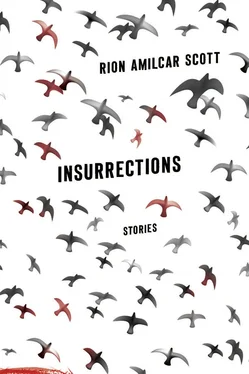I know where Ezekiel is. He’s on a beach — in the Caribbean or Europe, somewhere where’s there’s no chance he’ll be snatched and brought back to face his problems. He’s looking calm, but yet still troubled. There on that beach, Zeke sips beer after beer as the waves crash. And he cocks his ear toward the whispering foam, hoping it will tell him how things went so wrong.
My father, dead now, but back then standing in that Episcopal church. Oak brown like the benches and tall like the sturdy tree out front that I often thought of when I thought of him. In fact, this Sunday I imagined him as that tree bursting from the ground beneath the undercroft, shattering the floor of the nave, the leaves of his head scraping the church ceiling. My father swayed, standing there, clean-shaven with a strong chin he used to hide beneath stubble or overgrowth. A shining knight among pawns, king to me and my mother and my sister (but in the church Jesus Christ is King and it’s wrong to say otherwise). Impeccably dressed. Thin knot in a tie lain slightly askew, just enough so we all remembered who he was and how far he’d come.
This was our happily ever after. Dad had stopped drinking. He and my mother were now getting along. My sister was in her first year of college at Freedman’s University. She lived on campus and didn’t often attend church with us anymore. My father told anyone who would listen and even those who wouldn’t that she had made the dean’s list. We had even moved north from our Southside apartment to a house my parents purchased near the far end of the park. Dad now worked steady and worked well. At least once per week he’d speak of the virtues of being one’s own boss. And each Sunday he said it was our duty to give it up to God, and I didn’t mind much.
On this particular Sunday, just after the rector made a point during the sermon, the scent of my father’s heavy cologne mingled with my mother’s perfume, causing me to release a sneeze that echoed through the cavernous church building. It was as if I shouted an Amen. The pastor responded with the same joke he told whenever anyone sneezed— Amens, achoos , I’ll take what I can get. I looked up at my father expecting to see anger bubbling behind his eyes. In the old days he would often scream about self-control when I shot forth a thunderous sneeze. Once, he waited until we got home from church and slapped me, a lesson he called it. That was long ago. So much had shifted within the man. He looked down, put his hand to my head, and smiled. He gave my spongy naps a squeeze. I took it as I took all his actions in those days: as parts of an extended apology for the rough times.
Sometimes he’d catch me gazing up at him while he sang Jesus songs — his voice lithe and bouncy — and he’d tap my hymnal, an order for me to serenade the Lord. But my voice embarrassed me. Croaky and cracky. Struggling to change from one non-tuneful state to another. God gave you that voice so you could praise him in any and every way you can, my father told me. Still, I rarely sang along.
I never did understand how my father so smoothly held notes for the delight of all around him. Even in the hard days when my father’s voice was liquor-stained, he could still sound like Paul Robeson’s little brother.
There was a moment that Sunday that I had looked toward for most of my short life. It came after a soaring Jesus number, and when the organist trailed off, the congregation sat with a thump. The wood whined beneath our weight. There was a silence punctuated by coughs and clearing throats. The rector started with the announcements. This was the announcement of a lifetime. Crafted specifically for me. The announcement that separated this boyhood from that manhood. Next week, confirmation class would begin. Twelve- and thirteen-year-olds and all other teens who had not yet been confirmed in Christ were to sign up for classes leading to the spring Sunday when we were to affirm our dedication to the Lord. My heart leapt. I nearly jumped from my seat and broke into open applause. With a class and a few simple words I would be a man in Christ’s eyes. I suppressed my smile as well as the urge to race to the narthex to sign up for classes. Instead, I prayed solemnly.
No, that’s not what happened. I remember it that way often, but the truth leaks through sometimes. At the moment of the big announcement, the rector had lulled me to sleep, and my head was back and my mouth open. My mother popped me on the cheek, lightly, but strong enough to send a message.
Open your eyes you lazy—, she whispered. You hear what the rector said? Don’t forget to sign up for confirmation class when the service is over.
Confirmation? Was it really time? The service couldn’t end soon enough, and after the final acolyte in the recessional passed, I raced to the narthex to find the list. Mine became the second name after Alana Spencer, intriguing because I was relatively new and didn’t know any of the other children in the parish. I wondered just whom I would be stepping into adulthood with.
Bobby! my mother called. It was Sunday in the late afternoon on the week confirmation class was to begin. I was in the back shooting a ball at the hoop my father had installed shortly after we moved in. The chilly air caused my nose to run as I jogged about the concrete, dribbling the ball and stopping short to pull awkward jump shots. Bobby! She raised her voice, still refusing to call me Bob or Rob or anything with any sort of dignity. My father had dibs on Robert, which was understandable. Even years later when I had grown into adulthood and my father was gone, she refused to call me Robert.
Goddamn it, Bobby, she called through the window. What goes through your big head when you ignore me? Don’t make me call your father for you.
I stilled the bouncing basketball and ambled over to the window. Huh? What did you say, Ma? I couldn’t hear you, I lied, speaking loudly as if there was a din to rise above. I wanted the act to be effective. My father could be a cold and ruthless disciplinarian, at least with me; the rod in my sister’s life had mostly been spared. He was probably in the basement working on repairing and restoring an old table — a beloved table left to him by my grandmother after she passed — that he said would make its debut at my confirmation party. It was missing a leg and covered in dust and scratches. He had started spending most of his free time sweating over the thing. When he was down there I heard the drone of power tools, the pounding of his hammer, and the stray screamed expletive.
Go take a shower, she said. It’s time to get ready for your class. And put on the good clothes I left on your bed. Don’t be going into the church looking ridiculous.
Normally I would protest her choice of clothes. The collars were too big, the pant legs too straight. But I had done all the disobeying I would be allowed for the day. I slunk past her and went into the shower, and when I got to my bed, I eyed the clothes she wanted me to wear as a man eyes shit stuck to the sole of his shoes. The massive collars. The faded straight-leg high-water slacks that fit nicely a year ago. They were all hand-me-downs my cousins wore in decades past, donated by my aunt when we were poor. To wear this outfit was to not accept our victory over poverty.
I began to squabble with her when I got out the shower, a damp towel wrapped around my waist and my bird chest sticking out.
Mom, you got me looking lame.
You are lame, she replied. Now put on the clothes. This lasted several minutes until my father came up the stairs. He squinted and flattened his mouth into a line, his mask of irritation.
Boy, get ready so I can drive you over there and get back in time to watch 60 Minutes , he said. I slunk away and changed into my ridiculous outfit.
Читать дальше












